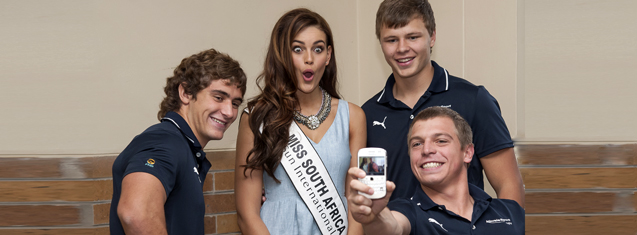
Miss SA and Shimla’s Young Guns captain motivate Kovsie students
Photo: Sonia Small
Rolene Strauss, Stefan Janse van Rensburg and Shimla’s Young Guns team awarded certificates of excellence by Dean: Student Affairs.
On her ninth day as Miss South Africa, Rolene Strauss, a fourth-year medical student at the UFS, together with Stefan Janse van Rensburg, captain of the Shimla’s Young Guns who won the U/20 Varsity Cup title, addressed a group of male students.
Residents of the JBM men’s residence, as well as the Shimla Young Guns, were inspired and motivated by Rolene and Stefan.
“Kovsies is where I come from; this is why I am who I am today. One day I will call my autobiography, Life as a garden, because I see life as a big garden where we all grow as flowers. In the Kovsie garden we are flowers with our roots firmly anchored in Kovsie soil.
“I take from Kovsies the ability to adapt, to appreciate and to care. With these positive characteristics, people around me experience freedom, love and kindness,” Rolene said.
Stefan told the group of students that it is important to surround yourself with people who can lift you up, especially in difficult times.
Rudi Buys, Dean: Student Affairs at the UFS, presented Rolene, Stefan and the entire Young Guns team, together with their coach, Jaco Swanepoel, certificates in recognition of excellence.